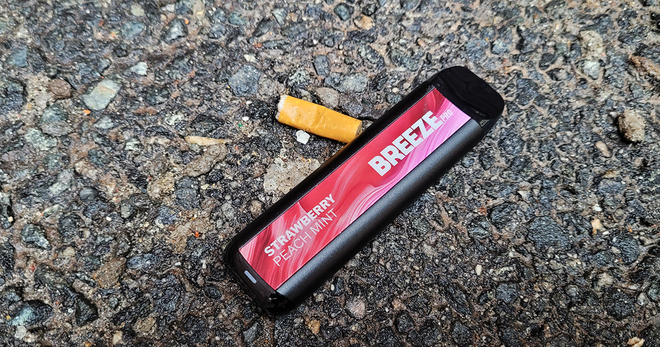What you need to know about new synthetic nicotine products
A new wave of synthetic nicotine products is emerging on the market, raising regulatory questions and health concerns as youth vaping continues at epidemic levels.
The disposable e-cigarette Puff Bar and oral nicotine products Bidi Pouches, NIIN and Rush are a few of these new products marketing synthetic nicotine, or nicotine that was created in a laboratory and not derived from tobacco. These new products, which have not been through the required regulatory review and approval processes, also come in flavors that are proven to attract youth.
While it is too early to know whether the health effects of synthetic nicotine are different than those of tobacco-derived nicotine, we do know that these products threaten to addict more young people. Here are some important things to know about synthetic nicotine.

What is synthetic nicotine?
What is synthetic nicotine?
Synthetic nicotine products state that their nicotine is developed in a lab and is not derived from tobacco leaf.
The makers of Puff Bar, which the Food and Drug Administration ordered to stop selling flavored e-cigarette products in July 2020, recently announced that they were returning to the market with “tobacco-free nicotine.” The company claims the nicotine is crafted from “a patented manufacturing process, not from tobacco,” and is purer than tobacco-containing or derived nicotine “without the residual impurities of tobacco-derived nicotine,” according to Puff Bar’s website.
Oral nicotine products are also marketing non-tobacco nicotine with big claims that have not been verified and may be misleading. The oral nicotine brand NIIN – short for “nicotine innovated” – is using nicotine “completely free of the many residuals and constituent impurities that are commonly found in tobacco-derived nicotine” as a selling point. Rush, another synthetic nicotine brand, offers a “modern” oral nicotine pouch without tobacco. Bidi Pouch launched in October 2020, pitches its tobacco-free product to “help adult smokers take their first steps in going smokeless.” Pacha Mama advertises its synthetic nicotine disposable e-cigarette as “50 mg (5%) Pure Synthetic Salt Nicotine.”
What is the difference between synthetic and “tobacco-free” products?
What's the difference between synthetic nicotine and other tobacco products
Synthetic nicotine products are not alone in their prominent marketing as “tobacco-free” products. Products that are promoted as tobacco-leaf free or “extracted from tobacco” include Velo, on!, Rogue, Zyn, and Lucy. These products are not synthetic because they use nicotine derived from tobacco, but they are marketed similarly, including with claims like “clean” and “pure,” which may be misleading to consumers.
Both types of products are marketed as “tobacco-free” because they don’t contain any tobacco leaf and even though these products may not look all that different, there are important regulatory differences between tobacco-derived nicotine products and synthetic nicotine products.
Oral nicotine pouches, whether synthetic or tobacco-derived, are growing in popularity. According to Nielsen data reported in an industry news article, dollar sales in convenience stores of nicotine pouches increased 470% in the first half of 2020. These new synthetic nicotine pouches could build off that market growth.
How are non-tobacco products regulated?
Is synthetic nicotine regulated?
These products are raising questions about whether they should be regulated as tobacco products or drugs, and some companies appear to be proceeding as if they are exempted from FDA regulation altogether.
The FDA regulates all nicotine products, though different regulatory schemes apply depending on where the nicotine came from. Products containing tobacco or tobacco-derived nicotine must go through the Center for Tobacco Products, while nicotine-containing products that aren’t tobacco-derived should be considered drugs and must go through the Center for Drug Evaluation and Research approval process for safety and effectiveness. However, FDA has not made a decision on how it will regulate synthetic nicotine products, and in the meantime these products remain on the market.
Some companies claim that synthetic nicotine products do not have to be regulated by the Food and Drug Administration at all. For example, in its press release announcing its product launch, NIIN wrote: “Since our synthetic nicotine pouches are not derived from tobacco, they are not classified as a tobacco product, which means that they are not currently under FDA regulation.” In its e-mail announcing its synthetic nicotine disposable e-cigarette, Pacha Mama went so far as to say “No PMTA required,” referring to the Premarket Tobacco Product Application the FDA requires manufacturers submit for new tobacco products. It has since removed that language from its website.
Truth Initiative and its partners sent a letter to the Food and Drug Administration’s acting commissioner about Puff Bar’s reentry to the market with its claim of new synthetic nicotine products and called on the agency to immediately demand that Puff Bar products be removed from the market or face enforcement action. The letter also called on the agency to clarify the regulatory status of synthetic nicotine products and make that decision clear to the public, consumers, manufacturers, and retailers.
The role of nicotine in addiction
Is nicotine bad for teens?
Nicotine is harmful to developing brains. Nicotine use during adolescence can disrupt the formation of brain circuits that control attention, learning, and susceptibility to addiction. Research has shown early age of smoking and pleasurable initial experiences are correlated with daily use and lifetime nicotine dependence.
Truth Initiative strongly urges the FDA to remove from the market all unauthorized nicotine products – regardless of the source of nicotine. This includes Puff Bar, which has not been authorized for sale.
More in harmful effects of tobacco
Want support quitting? Join EX Program
By clicking JOIN, you agree to the Terms, Text Message Terms and Privacy Policy.
Msg&Data rates may apply; msgs are automated.


